PRINCETON, NJ -- Twenty-three percent of Americans say John McCain's age would make him a less effective president were he to win in November, while only 8% say Barack Obama's race would make him less effective.
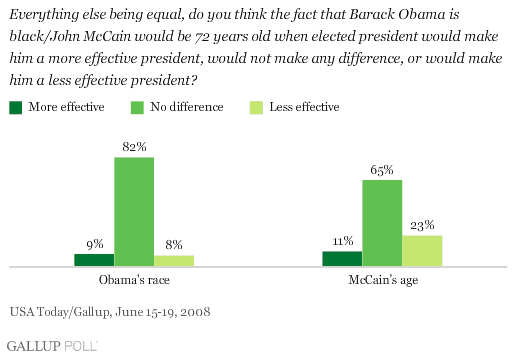
These results emanate from two questions included in a July 15-19 USA Today/���۴�ýpoll. One question asked respondents whether Obama's race would make him more effective, would make him less effective, or would make no difference if he were to be elected president. A parallel question asked about the perceived impact of the fact that McCain would be 72 when inaugurated next January, were he to win.
More than 8 out of 10 Americans say Obama's race would make no difference in terms of his effectiveness in the White House. Of the rest, just as many say his being black would make him more effective as president as say it would make him less effective. Thus, as far the public is concerned, Obama's race appears to be a wash in terms of perceptions about his ability to serve effectively as president.
There is more expressed concerned about McCain's age. As is the case with Obama's race, the majority of Americans say that McCain's being 72 next January would not make any difference in terms of his effectiveness in the White House. But 23% say McCain would be less effective as a result of his age, while 11% say he would be more effective. The net result is a slightly negative view of the impact of McCain's advanced age.
Over a third of Obama voters in the poll's sample say McCain's age would make him a less effective president, although that leaves a majority who still say it would make no difference. On the other hand, just 19% of McCain's own supporters say his age would make him more effective (only 8% say less effective).
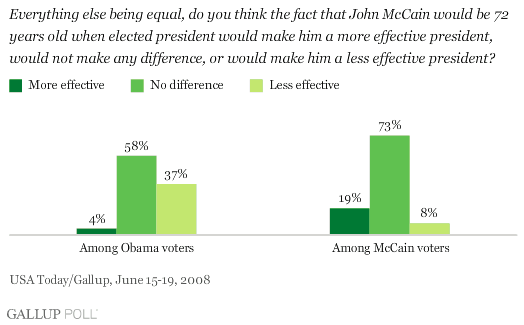
Exactly the same percentage -- 82% -- of both Obama voters and McCain voters say Obama's being black would make no difference in terms of his effectiveness as a president. But, importantly, only 14% of McCain voters have a negative view of the impact of Obama's race (compared with the 37% of Obama voters who view the impact of McCain's age negatively).
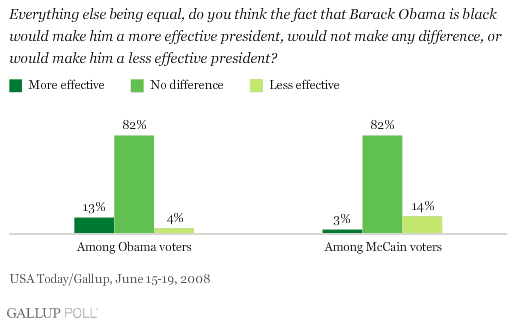
There is a slight tendency for Obama voters to say Obama's being black would be a plus, while McCain voters are slightly more likely to say it would be a negative, but these are not major differences.
Independents, the key group that both campaigns are heavily targeting, basically reflect the opinions of the overall average in their views of the impact of Obama's race and McCain's age.
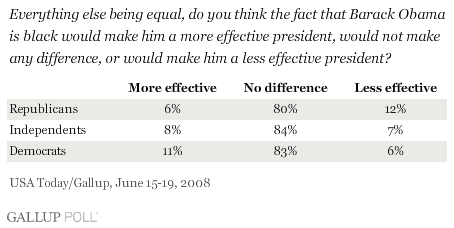
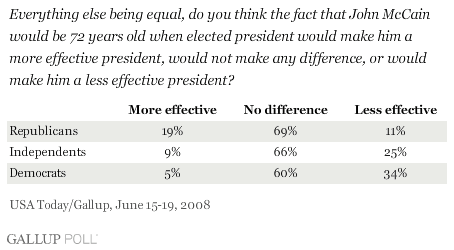
The Views of Older Americans and Black Americans
One might expect that older Americans would be more likely than younger Americans to be positive about the impact of McCain's age, but the differences by age group are slight.
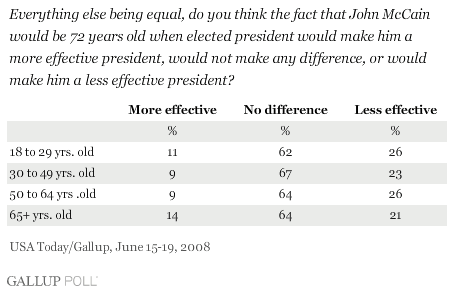
Even among the group of Americans 65 and older, McCain's age is seen as a net negative, with 21% saying it will make him less effective, and only 14% saying it will make him more effective. These views are only slightly different from those of the younger age groups. By the same token, young Americans, aged 18 to 29, are basically no more negative about McCain's age than are those in older age groups.
A separate analysis looked just at respondents who themselves are aged 72 or older, the group obviously most likely to be aware of the implications of McCain's age on his ability to govern as president.
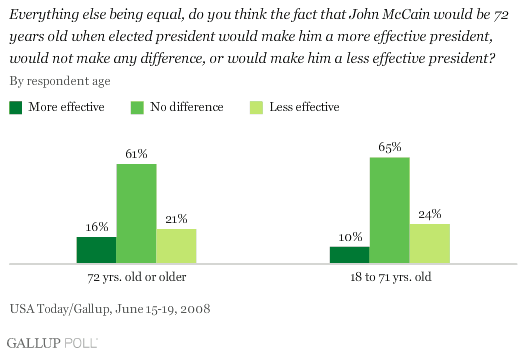
Among this group, there is a little more sentiment that McCain's age would make him less effective than there is that his age would make him more effective, while 6 out of 10 say it would make no difference.
Black Americans are little different from whites in their views of the impact of Obama's race.
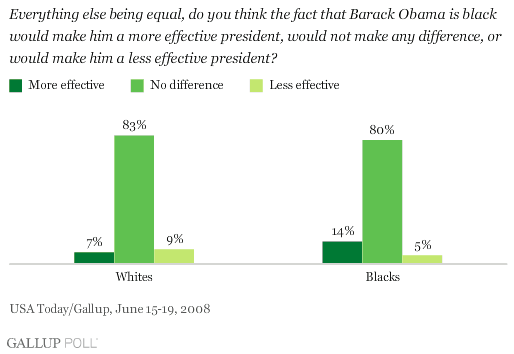
Blacks are slightly more likely than whites to perceive that Obama's race would be a net plus for his effectiveness as president, but the difference, as noted, is not large at all. Eight out of 10 or more of both whites and blacks perceive that Obama's race would make no difference.
Implications
The majority of Americans appear to believe that neither McCain's age nor Obama's race will make a difference in terms of either candidate's effectiveness as president should he be elected this November. Among those who do think these factors would make a difference, however, there is somewhat more concern about McCain's age than there is about Obama's race. This is fueled in part by the views of Obama's current supporters, more than a third of whom say McCain's age will make him less effective.
McCain, who has often referred to the health and vitality of his elderly mother as an indication of the fact that older people can be alert and effective, may be discouraged to find that he gets no strong endorsement of the positive impact of age from older Americans who are at least the age he will be in January. A majority of those who themselves are 72 and up say McCain's age will make no difference to his presidency. But among those who do have an opinion, slightly more still say it will make him less effective than say it will make him more effective as president.
It might be hypothesized that black Americans would see Obama's race as a plus for his effectiveness in the White House, for example in terms of his ability to reach across racial lines in addressing race problems in the country. But there is little evidence of such attitudes in these data. Black Americans are as likely as white Americans to say Obama's race will make no difference, and only a small 14% of blacks say Obama would be more effective as a result of his race. At the same time, an even smaller 5% of blacks say Obama's race would make him less effective, suggesting little concern that he might face resistance to his presidency as a result of his race.
Survey Methods
Results are based on telephone interviews with 1,625 national adults, aged 18 and older, conducted June 15-19, 2008. For results based on the total sample of national adults, one can say with 95% confidence that the maximum margin of sampling error is ±3 percentage points.
Interviews are conducted with respondents on land-line telephones (for respondents with a land-line telephone) and cellular phones (for respondents who are cell-phone only).
In addition to sampling error, question wording and practical difficulties in conducting surveys can introduce error or bias into the findings of public opinion polls.
In addition to sampling error, question wording and practical difficulties in conducting surveys can introduce error or bias into the findings of public opinion polls.
To provide feedback or suggestions about how to improve Gallup.com, please e-mail feedback@gallup.com.
